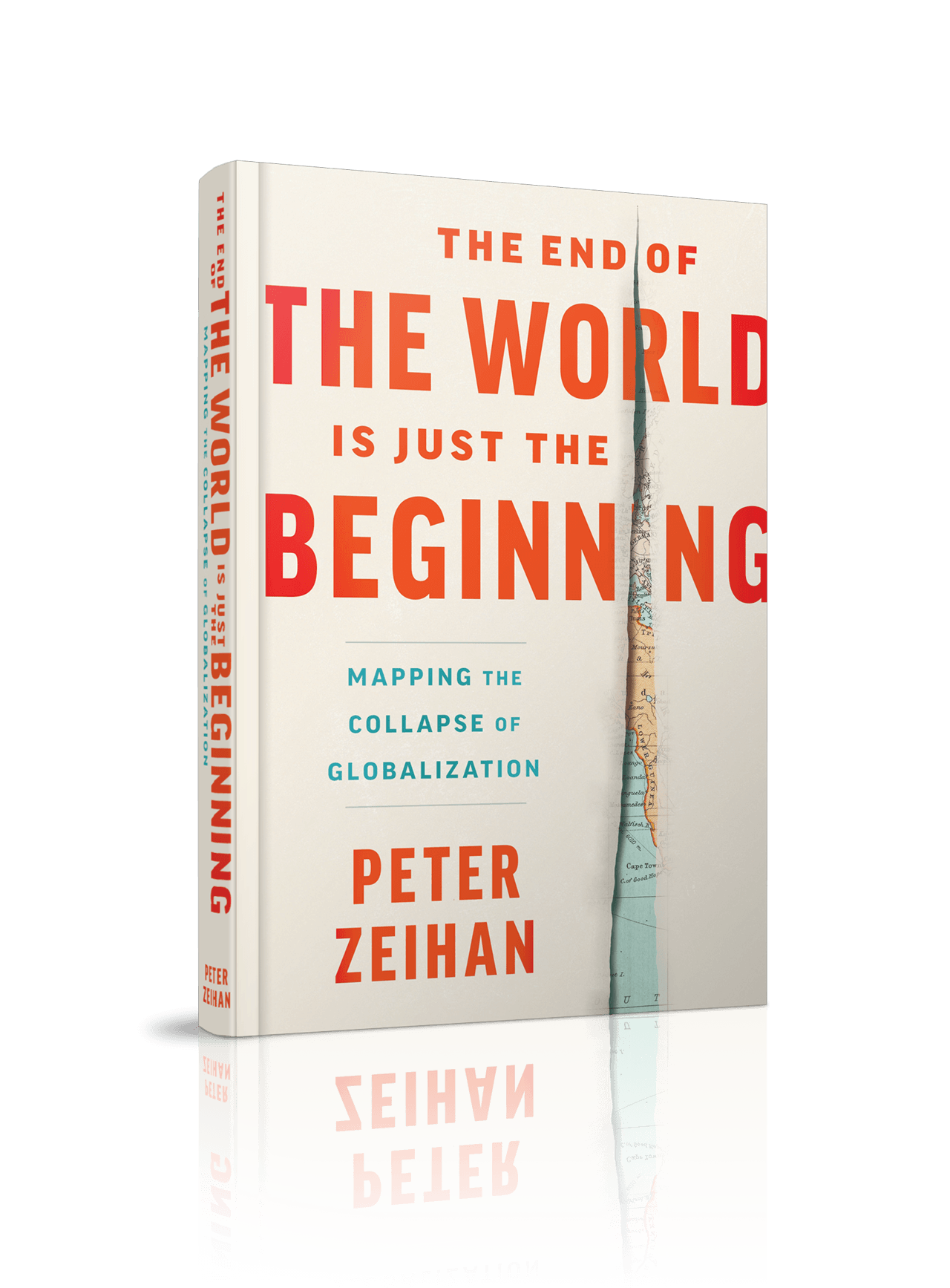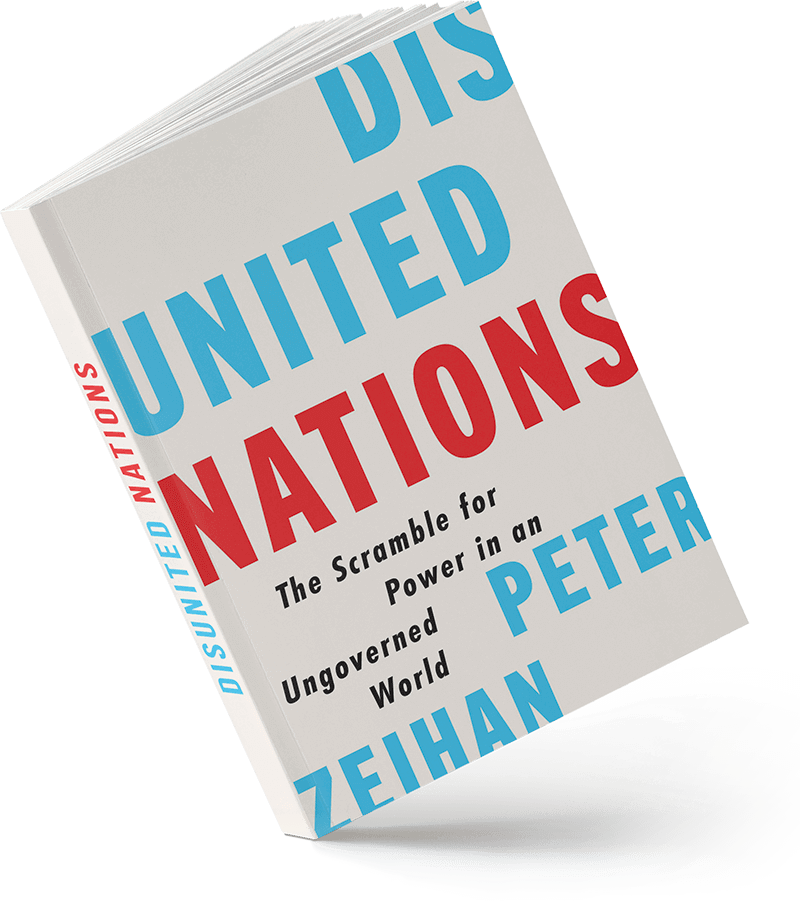Peter Zeihan
Peter Zeihan combines a deep understanding of geography, demography, energy and trade to help his clients make sense of a complicated world.
Peter Zeihan is a geopolitical strategist, which is a fancy way of saying he helps people understand how the world works. Peter combines an expert understanding of demography, economics, energy, politics, technology, and security to help clients best prepare for an uncertain future.
Over the course of his career, Peter has worked for the US State Department in Australia, the DC think tank community, and helped develop the analytical models for Stratfor, one of the world’s premier private intelligence companies. Peter founded his own firm — Zeihan on Geopolitics — in 2012 in order to provide a select group of clients with direct, custom analytical products. Today those clients represent a vast array of sectors including energy majors, financial institutions, business associations, agricultural interests, universities and the U.S. military.
With a keen eye toward what will drive tomorrow’s headlines, his irreverent approach transforms topics that are normally dense and heavy into accessible, relevant takeaways for audiences of all types.
Peter is a critically-acclaimed author whose first two books — The Accidental Superpower and The Absent Superpower — have been recommended by Mitt Romney, Fareed Zakaria and Ian Bremmer. His latest third title, Disunited Nations: The Scramble for Power in an Ungoverned World became available in March 2020.
Peter’s fourth book, The End of the World is Just the Beginning: Mapping the Collapse of Globalization, became available in June 2022.
AFTER THE PEAK: FINANCE IN AN AGE OF LESS
For the past three decades our world has known ever-rising volumes of money. Whether from Wall Street, the Federal Reserve, Europe or East Asia, this rising tide of capital at ever-cheaper rates has defined the post-Cold War era. It’s ending. Now. For reasons geopolitical and demographic, the globalization of finance is in its final months just as the overall inflows are dissolving for reasons demographic. This isn’t momentary. We will not return the capital structure of the 2000s and 2010s within our lifetimes. The questions now become how deep the crash will be, which sectors will suffer the most, and what islands will be able to weather the coming financial storm?
AT THE EDGE OF DISORDER
The concept of countries being able to buy and sell their wares openly on the international marketplace is inviolable. The freedom to sail one’s products around the world is a given. Everything from the transfer of money to the accessibility of energy is sacrosanct. Yet all this and more is artificial: an unintended — if happy — side effect of the American-led global Order. With that Order in its final days, all countries and all industries must learn to operate in a world as unstructured as it is dangerous. Join us as Peter Zeihan lays out how we got to where we are, and what the future holds for sectors as diverse as energy, agriculture, finance, manufacturing and transport.
A WORLD WITHOUT CHINA
Three pillars support modern China’s success: global trade, internal political unity, and easy money. With those three pillars, China has managed to shake 2000 years of war and occupation and remake itself as one of the world’s most powerful countries. Yet none of these three pillars can stand without American assistance, and that cooperation is ending. China’s “inevitable” rise isn’t simply over, it is about to go into screeching, unrelenting, dismembering reverse. But that’s hardly the end of history. When a country falls — particularly the world’s top manufacturing power — the ripples affect countries and industries near and far. Learn who benefits and who loses in a world without China.
THE RETURN OF DOLLAR DIPLOMACY
The Mideast wars have left the United States exhausted and leery. Immigration has become a four-letter word. Shale has severed most of the ties that bind. In sum, the United States has lost interest in the wider world and so is already hip-deep in a decade-long retrenchment. That will change not just the world, but America itself. Such evolutions will make next phase of American engagement not just more thoughtful and surgical, but also more lucrative.
NO ASSEMBLY REQUIRED: THE FUTURE OF GLOBAL MANUFACTURING
The world of manufacturing is an endlessly specialized venture, with most manufacturers sourcing components from scores of facilities across a dozen or more countries. But what if the ability to sail components from site to site became compromised? What if capital availability proves insufficient to update industrial bases as technology evolves? What if intermediate and end markets become less desirable – or less accessible? All that and more is about to happen, which signals the end of manufacturing as we know it. The successful manufacturers of the future will be those who can command access to raw materials, capital, labor and markets – all in the same location.
THE NORTH AMERICAN DRUG WAR
By nearly any definition Mexico should be a failed state, yet because of its location adjacent to the global superpower it instead will be one of the world’s most successful countries. Within the story of Mexico lies the greatest opportunities — and gravest threats — of our time.
THE CHINA WARS
The growth of the Chinese economy has been exceptional. But as much as we all “know” that China is the country of the future, in reality the Chinese system is already breaking apart. Chinese “success” is based upon a financial structure that is cracking, a demographic moment that has nearly ended, and an international environment over which it has no influence. What follows will not end Chinese participation in the global system, but it will certainly end Beijing’s.
THE NEW MIDDLE EAST
For decades the Middle East has been trapped in a simple, irresistible tension: the world needs the region’s oil, so the global superpower keeps the region locked in place. Within a very few short years that lock will be removed, and the region’s politics will unravel explosively. What comes next will challenge every country in the region — many to the breaking point.
THE END OF THE WORLD…AND OTHER OPPORTUNITIES
Conflicts Russian, Middle Eastern and Asian are about to trigger the greatest energy crisis in history. Dozens of countries are slipping into deflationary spirals from which there is little hope of escape. And America’s swerving into demagogic populism will unhinge its entire alliance network. The world as we know it is in its final days. Find out how and why it all came to be, how and why it is all falling apart. But most of all find out how the world’s end heralds the greatest expansion in American power and security in the history of the Republic.
SUPERSIZE ME: THE FUTURE OF GLOBAL ENERGY
The global energy sector is as complicated and opaque as it is omnipresent and essential, and it has adapted to not simply the changes in the global economic system, but the global political system. Countries that were weak to nonexistent in ages past now are major players in global energy markets, both as producers and consumers. The system that has allowed this evolution now is under fire, and soon the stability that has enabled the energy sector to create its global webwork will end. What will follow will be a world both more chaotic and poorer, one in which the process of finding, producing, transporting and refining energy will simply be beyond the military and financial capacity of most players. Only the largest, smartest and richest entities will be able to maintain – much less expand – their networks. Far from its final days, the era of the supermajor has not yet begun.
THE AMERICAN AGE
Americans think of themselves as set apart from the rest of the world, and to a certain degree they are correct. But it is not that Americans are ‘better’ or ‘more free’ that makes them different, instead that they enjoy supreme geographic positioning and favorable demography — something that is not currently enjoyed by any other major power. Played as little as twenty years forward, this will result in an American-dominated international system with all of the economic and strategic benefits that such implies. But it is a very different world from the one we now know.
LIFE AFTER EUROPE
The entire European experiment occurred within the Cold War framework that was both artificial and imposed from outside. That framework is dissolving and anything that used it as a foundation — up to and including the euro — is now dissolving with it. Zeihan will lay out why Europe’s strengths — not its debts — have made the euro’s fall inevitable, as well as what life after the common currency will look like not just in Europe, but around the world. The picture is not as dark as you might think.
THE ALBERTA QUESTION
As the global system evolves no country is better positioned than Canada. Very soon Canada’s choices will be about how to take advantage of opportunities, rather than how to avoid complications. But in this very silver lining is a very dark cloud. The same evolutions that will allow Canada unprecedented opportunities for wealth and respect also hold the possibility of damaging the Canadian state. This time the dangers do not originate from the United States, but from within Canada itself. And they could very well prove mortal.
MANUFACTURING (IN) A NEW WORLD
Manufacturing is an endlessly specialized and complicated venture, with most manufacturers directly or indirectly sourcing components from around the country and world. But what if the ability to sail components from site to site becomes compromised? What if capital availability proves insufficient to update industrial bases as technology evolves? The successful manufacturers of the future will be those who can command access to raw materials, capital, labor and markets – within defined areas of proximity. Such days are nearly upon us. Differences in COVID recovery and demographic structures are intermingling with failing Chinese relationships to push manufacturing in an entirely new direction.
AMERICA ON THE EDGE
The world as we know it is ending. Global trade and everything that comes from it — cheap Asian goods, international energy markets, global agriculture, stable finance — is about to unravel. Out of all this the Americans — cast in both the role of disruptor and survivor — are making decisions that will shape both themselves and the rest of the world for decades. Get a sneak peak at the future of energy, agriculture, finance, and the role America will play in the world to come.
THE END OF EUROPE
Five recessions in nine years. A litany of debt debacles. Ossified institutions incapable of change. Rising populism. Refugee floods. Russians growling at the border. And that’s the good news. Despite a decade of crisis none of Europe’s problems have had their root causes addressed, and now time is simply up. Everything that makes modern, wealthy, cosmopolitan, democratic Europe possible is breaking apart, and the Europeans are about to lose far more than “merely” a decade. Discover what makes Europe tick, what is tearing it down, and most of all, what is next.
RETOOLING FOR THE END OF THE WORLD
Supply chains are shattering like toothpicks. Energy supplies face their greatest stress of the modern era. Global agriculture is being unmade day by day. Finance has peaked, and it is a long way down. Far from expanding out of control, populations are instead crashing. We face nothing less than the end of the globalized age. Are you ready? No? You’re hardly alone. Join us as geopolitical strategist Peter Zeihan lays out the end of the old world, and the beginning of the new.
AMBER WAVES OF (AMERICAN) GRAIN: THE FUTURE OF GLOBAL AGRICULTURE
Modern agricultural patterns are the result of three largely unrelated factors: low-risk global trade, insatiable Asian demand, and unlimited cheap credit. Within the next five years, all three of these trends will not just evaporate, but invert. When that happens, the only thing that will hurt more than the gradual loss of demand will be the sudden collapse of supply. However, none of this impacts the American producer – it therefore will be the United States that will reap the benefits of its productivity and stability for decades to come.
LIFE AFTER FREE TRADE
Bretton Woods is the cornerstone of the modern system. The concept of countries being able to buy and sell their wares openly on the international marketplace is inviolable. The freedom to sail one’s products around the world is a given. Everything from the transfer of money to the accessibility of energy is sacrosanct. All this and more is artificial. All this and more is about to end. What replaces it will either be wondrous or damning. Your outcome depends upon where you live.
THE NEW FACE OF TERRORISM
The constellations of factors that allowed groups like al Qaeda to function are coming undone, ushering in an age in which transcontinental terrorism will cease to be an issue of significance. But that does not mean that the world will be terror-free. Hardly. It “simply” means that that the terrorism of tomorrow can be mapped.
THE NEW FACE OF IMMIGRATION
Give me your tired, your poor, your huddled masses yearning to breathe free… This has been the mantra that Americans have championed — and sometimes resisted — since the foundation of the Republic. The idea that America is where the poor can gain a new start. In the near future this sentiment will prove only half true. The next wave of migration will be the cream of the global labor pool.
SOUTHEAST ASIA RISES
The world of the future will feature reduced trade opportunities, more difficult access to energy and more challenging security concerns. But in one corner of the world exists a series of relationships that will stand the test of time. Southeast Asia will emerge as an echo of the free trade of times past, making it one of the very few parts of the world to survive more or less as we know it now, perhaps even with some surprises to the upside.
SEVEN(TEEN) YEARS OF LEAN: THE FUTURE OF GLOBAL FINANCE
In the decades since World War II, everything from computerization to securitization to the rise of the developing world has made the financial sector central to modern economic activity. But never forget that modern finance itself is an outgrowth of revenues generated by the global free trade order. Never forget that the past two decades have witnessed the richest and cheapest supplies of capital in history. A political decision made seven decades ago created the trade order. A fleeting demographic moment created the capital richness. Both have nearly run their course. Very soon we will bid finance as we know it goodbye, and the world will be much poorer for it. A few locations, however, will find the wreckage easier to struggle through than others. For those lucky few, the world will be their oyster.
THE SHALE REVOLUTION
The advent of the shale era is remaking the American energy complex. The combination of at-home investment and a lower need for Middle Eastern involvement frees up considerable American resources. The result will be a different sort of American economy, a different sort of American diplomacy, and a different role for the United States on the global stage.
WHAT EVERY FINANCIAL PROFESSIONAL SHOULD KNOW ABOUT GEOPOLITICS
Geopolitics is the study of how place impacts people — whether that impact be cultural, military, economic, political…or financial. Everything from how banks lend to how stocks are traded is heavily colored by where one lives, and understanding the unspoken — and often unacknowledged — rules of the game can prove critical to financial success. Zeihan explains how geography impacts the various regions differently, how this elevates some sectors while enervating others, and what sort of surprises — both good and bad — are about to burst onto the stage.
POWERS OF YESTERDAY, POWERS OF TOMORROW
Americans believe that their greatest days are behind them and that a series of new powers is rising up to displace them. On the contrary, America’s best days — militarily, economically, financially and culturally — are still ahead of them. In fact, many of the states that the Americans feel are up-and-comers — most notably China, Russia and India — are merely experiencing a historical moment in the sun courtesy of factors utterly beyond their control. Most of the powers of tomorrow are countries that the Americans either have very little knowledge of. The major powers of 2030 will not based in Beijing or Moscow, but in Jakarta, Buenos Aires, Warsaw, Istanbul and Mexico City.
BRIC-A-BRAC
The emergence of Brazil, Russia, India and China offered the possibility of remaking the global system. Well, it was fun while it lasted. Each BRIC country now faces their own custom-made nightmare, with only one of them likely even having a future as a country.
As our opening keynote speaker, Peter hit a home run with our executive conference attendees. [Peter was] insightful and thought provoking, plus did a great job in addressing the key geopolitical issues faced by the energy sector.
American Gas Association
Raymond James recently had the pleasure of working with Peter Zeihan at one of our Economic and Strategy Seminars. Peter was extremely well received by our clients and associates and held their attention with his brilliant insight into current topics around the world, political, social and geographic. His knowledge of the subject matter and clever wit was both informative and entertaining. We strongly recommend Peter and we hope to include him in future events.
Raymond James & Associates
We had Peter speak at our national association meeting on three occasions. He was the top rated presenter on all occasions. Based on his performance and the reception by our members, we have added him to the faculty of our executive development program. He is a dynamic and engaging speaker with a unique perspective and insight into global economics and geopolitical issues.
Association of Agricultural Production Executives
We were very happy to have Peter Zeihan open our international conference as the keynote speaker. Mr. Zeihan delivered a polished and provocative commentary on the world outlook. He combined powerful graphical displays, demography, geography, and historical perspectives to convey a comprehensive picture of the geopolitical forces shaping our world. With a bit of humor and irreverence, Peter presents his weighty subject matter in a lively and entertaining style. I heard attendees discussing his program throughout our conference.
American Society of Appraisers
Peter's delivery was so engaging that all track of time was lost as the group was completely engrossed in the information being presented.
Earle M. Jorgensen Company
We thoroughly enjoyed his presentation and the time he took with both our folks and our clients throughout the day that Tuesday. He was very well received at our conference, and I know my colleagues who weren’t able to attend would stand to gain much from his talk as well as our clients.
OpenLink
THE END OF THE WORLD IS JUST THE BEGINNING
DISUNITED NATIONS





